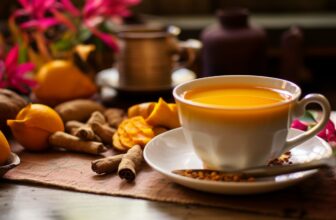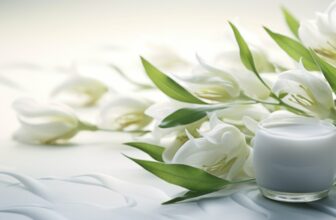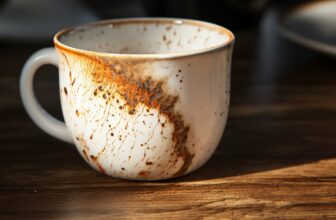
Pronouncing chai tea correctly is crucial to fully appreciate this delightful drink. Correct pronunciation not only ensures accurate communication but also shows respect for the cultural traditions associated with chai tea.
One of the most common mispronunciations of chai tea is adding an extra syllable. It should be pronounced with emphasis on the second syllable, ‘chai TEA’, rather than the first.
To pronounce chai correctly, start by saying ‘ch’ as in ‘church’ and then emphasize the long ‘i’ sound as in ‘eye’.
Key Takeaways:
- Pronouncing chai tea correctly is important to fully appreciate its taste and cultural significance.
- Emphasize the second syllable, ‘chai TEA’, when pronouncing chai tea.
- The correct pronunciation of ‘chai’ starts with ‘ch’ as in ‘church’ and emphasizes the long ‘i’ sound.
- Chai tea originates from India and is a blend of black tea and spices.
- There are variations of chai tea, including the traditional Indian version called masala chai, as well as herbal chai and decaf chai.
Understanding the Correct Pronunciation of Chai Tea
To pronounce chai tea correctly, it’s important to understand the phonetics and enunciation of each syllable. Many people mistakenly add an extra syllable when saying ‘chai tea’, but the correct pronunciation emphasizes the second syllable, ‘chai TEA’, rather than the first.
Let’s break it down:
- Start by pronouncing the ‘ch’ sound, similar to the ‘ch’ in ‘church’.
- Next, emphasize the long ‘i’ sound, like the ‘i’ in ‘eye’.
By putting these sounds together, you’ll be able to accurately pronounce ‘chai’. However, remember to place the emphasis on the second syllable, ‘TEA’.
“Proper pronunciation is essential for effective communication and showing respect for cultural traditions.”
Chai tea originates from India and is a delicious blend of black tea and spices. The traditional Indian version, known as masala chai, has become popular worldwide. In addition to masala chai, there are other variations like herbal chai and decaf chai that cater to different preferences.
| Type | Description |
|---|---|
| Masala Chai | A traditional Indian version made with black tea, milk, spices (such as cardamom, cinnamon, ginger, and cloves), and sweeteners (typically sugar or honey). |
| Herbal Chai | A caffeine-free alternative made from a variety of herbs, including chamomile, peppermint, and rooibos. It offers a soothing, aromatic experience. |
| Decaf Chai | Similar to masala chai but without the caffeine. It provides a comforting and flavorful option for those who prefer to limit their caffeine intake. |
Emphasizing the Right Syllable
The key to pronouncing chai tea correctly is emphasizing the second syllable, ‘TEA’, rather than the first. Many people mistakenly add an extra syllable, saying ‘CHAI-ee’ instead of ‘CHAI’. To avoid this mispronunciation, let’s break it down step by step.
First, start with the sound ‘ch’ as in ‘church’. Make sure to enunciate it clearly, as this is the initial sound of ‘chai’. Next, emphasize the long ‘i’ sound, similar to the word ‘eye’. It should be pronounced like ‘CHAI-TEA’.
Remember, the key is to stress the ‘TEA’ part of the word, giving it the correct pronunciation. By emphasizing the second syllable, you’ll be able to confidently order and discuss chai tea, while showing respect for its cultural origins.
Chai tea has its origins in India and is a blend of black tea and spices. The traditional Indian version, known as masala chai, is a rich and flavorful beverage that has gained popularity worldwide. However, there are also other variations of chai available, such as herbal chai and decaf chai, catering to different tastes and preferences.
So, the next time you find yourself craving a cup of chai tea, remember to pronounce it as ‘CHAI-TEA’ with emphasis on the second syllable. Enjoy the delightful flavors and aromas of this beloved beverage, while appreciating its cultural significance.
Summary:
- Pronounce chai tea as ‘CHAI-TEA’, emphasizing the second syllable.
- Start with the ‘ch’ sound as in ‘church’.
- Emphasize the long ‘i’ sound, like ‘eye’.
- Chai tea originates from India and comes in various versions, including masala chai, herbal chai, and decaf chai.
| Incorrect Pronunciation | Correct Pronunciation |
|---|---|
| CHAI-ee | CHAI-TEA |
| CHAI-tee | CHAI-TEA |
| CHAI-tay | CHAI-TEA |
Remember, mastering the pronunciation of chai tea not only ensures clear communication but also demonstrates your appreciation for the cultural traditions associated with this beloved beverage.
Mastering Chai Pronunciation
Let’s master the pronunciation of ‘chai’ by breaking it down into its individual sounds. Proper pronunciation is crucial for clear communication and demonstrating respect for cultural traditions. One of the most common mispronunciations is adding an extra syllable to the word. Remember, it’s ‘chai TEA’, not ‘CHAI-ee tea’.
To pronounce ‘chai’ correctly, start by saying the ‘ch’ sound as in ‘church’. Next, emphasize the long ‘i’ sound as in ‘eye’. Put these sounds together, and you have the correct pronunciation of ‘chai’.
Breaking Down the Sounds
Let’s delve even deeper into the sounds that make up ‘chai’. The ‘ch’ sound is created by placing the tongue against the roof of the mouth near the back, like the ‘ch’ in ‘church’. Then, transition smoothly into the long ‘i’ sound, where the tongue is relaxed and positioned towards the front of the mouth, similar to the ‘i’ in ‘eye’. Practice these sounds individually and then combine them to perfect your ‘chai’ pronunciation.
Now that you’ve mastered the pronunciation of ‘chai’, let’s explore its origins and various forms. Chai originates from India, where it is a popular beverage made from a blend of black tea and spices. The traditional Indian version, known as masala chai, incorporates spices like cardamom, cinnamon, ginger, and cloves. This delightful combination adds depth and complexity to the flavor of the tea.
While masala chai is the traditional version, there are also other variations available. Herbal chai, for example, substitutes the black tea base with herbal infusions, making it a caffeine-free option. Decaf chai is another alternative for those who wish to enjoy the flavors of chai without the stimulating effects of caffeine. These variations allow for versatility and cater to different preferences.
| Chai Variations | Description |
|---|---|
| Masala Chai | The traditional Indian version made with black tea and a blend of spices like cardamom, cinnamon, ginger, and cloves. |
| Herbal Chai | A caffeine-free option that replaces the black tea base with herbal infusions, offering a variety of flavors. |
| Decaf Chai | A version of chai that removes the caffeine, perfect for those who prefer to avoid stimulating effects. |
Remember, mastering the proper pronunciation of ‘chai’ not only enhances your ability to communicate accurately but also shows respect for the rich cultural heritage associated with this beloved tea.
The Origins and Variations of Chai Tea
Discover the rich history and different variations of chai tea, from traditional masala chai to herbal and decaf chai. Chai, which originates from India, is a delightful beverage that is loved for its aromatic flavors and soothing qualities.
The traditional Indian version of chai tea is known as masala chai. It is made by brewing black tea with a blend of aromatic spices such as cardamom, cinnamon, ginger, cloves, and black pepper. The combination of these spices creates a warm and invigorating flavor that is perfect for chilly days or as a comforting treat any time.
Aside from masala chai, there are also herbal and decaf variations of chai tea. Herbal chai is caffeine-free and is made using a base of herbal tea, such as rooibos or chamomile, combined with a similar mix of spices. It offers a soothing and relaxing experience without the stimulating effects of caffeine, making it a great choice for those who are sensitive to or prefer to avoid caffeine.
Decaf chai, on the other hand, retains the same classic flavors as masala chai but with the added benefit of being caffeine-free. It is made using decaffeinated black tea which undergoes a process to remove most of the caffeine content. This allows chai lovers to enjoy the rich and aromatic flavors of chai tea without the potential sleep disruptions that caffeine can cause.
| Variation | Base Tea | Key Ingredients | Characteristics |
|---|---|---|---|
| Masala Chai | Black Tea | Cardamom, Cinnamon, Ginger, Cloves, Black Pepper | Warm, Invigorating |
| Herbal Chai | Herbal Tea (Rooibos, Chamomile, etc.) | Cardamom, Cinnamon, Ginger, Cloves, Black Pepper | Soothing, Relaxing |
| Decaf Chai | Decaffeinated Black Tea | Cardamom, Cinnamon, Ginger, Cloves, Black Pepper | Caffeine-Free, Flavorful |
Conclusion
Proper pronunciation of chai tea is not only crucial for accurate communication but also for respecting the cultural origins of this beloved beverage. Chai tea has its roots in India, where it is a popular beverage enjoyed by millions. The correct pronunciation, emphasizing the second syllable ‘TEA’, is essential for showing respect for the traditions and heritage associated with this drink.
To pronounce chai tea correctly, start by saying ‘ch’ as in ‘church’ and then emphasize the long ‘i’ sound as in ‘eye’. Avoid the common mistake of adding an extra syllable at the beginning. By mastering the pronunciation, you can engage in meaningful conversations about chai tea and appreciate its significance in various cultures.
In India, masala chai is the traditional version of chai tea. It is made by combining black tea with a blend of aromatic spices like cardamom, cinnamon, ginger, and cloves. This flavorful combination creates a unique and invigorating drink that has become popular worldwide.
While masala chai is the classic variety, there are also other variations of chai tea available, such as herbal chai and decaf chai. These alternatives offer different flavors and cater to specific dietary preferences or caffeine sensitivities.
So, when you savor a cup of chai tea, take a moment to appreciate the cultural heritage behind it and pronounce it correctly. By doing so, you not only convey respect for the origins of this beverage but also enhance your own experience and understanding of chai tea’s rich traditions.
FAQ
Q: How do you pronounce chai tea?
A: Chai tea should be pronounced with emphasis on the second syllable, ‘chai TEA’, rather than the first. Start by saying ‘ch’ as in ‘church’ and then emphasize the long ‘i’ sound as in ‘eye’.
Q: Where does chai tea originate from?
A: Chai tea originates from India.
Q: What is the traditional Indian version of chai tea?
A: The traditional Indian version of chai tea is known as masala chai.
Q: Are there any variations of chai tea?
A: Yes, there are variations of chai tea, such as herbal chai and decaf chai.
A: Proper pronunciation of chai tea is important for accurate communication and showing respect for culture and traditions.









